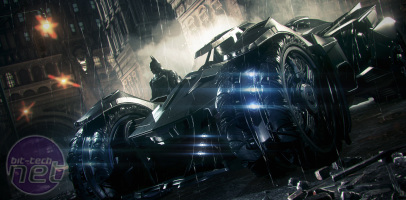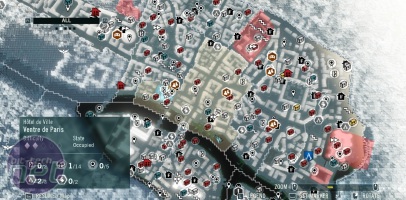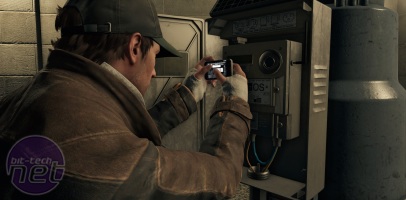
Imagine sitting down in a restaurant and ordering a meal; let's say, Surf and Turf with chips and a side-salad. The waiter informs you that the arrival time of your meal will be announced in ten minutes. The time passes, and the waiter rolls up and apologises, saying your meal has been delayed. But good news! They're ready to announce that the prawns for your surf and turf can now be ordered early for an extra £5.
[break]
Obviously, you're rather taken aback. The meal itself only cost £10, and you're pretty sure the prawns were initially advertised on the menu. But you're British and don't want to cause a fuss, so you shell out that extra fiver. Eventually, the meal arrives, only your steak isn't cooked and your fries are locked in some weird
rectangular contraption.
Now your confusion overrides your natural reserve, and you politely ask the waiter what on Earth is going on. He explains that your fries only become accessible if you complete a survey using the restaurant's iPhone companion app, and that the steak is undercooked because you mistakenly bought an Alpha Meal, and it won't be finished for another six months.
Growing frustrated, you ask if the waiter could at least bring you the salt and pepper. The waiter shakes his head, and points out that the salt and pepper are only available through the restaurant's "Season Pass".
I don't know what the salad represents in the metaphor, but that's fine because nobody eats it anyway.
Any restaurant that provided such a service would close quicker than a spring-loaded laptop. But all of this is par for the course when buying a modern videogame. What was once a simple process of purchasing a box and playing with the stuff you got inside is now a tangled quagmire of pre-order bonuses, season passes, companion apps, microtransactions, and unfinished alphas. It's a messy situation, and one which has significant ramifications for the notion of games as both products and works of art.
Lately, pre-orders and season passes have been under the most intense scrutiny. The announcement that Batman: Arkham Knight's Season Pass would cost as much as the game, and would include huge chunks of "content" including story missions and playable characters like Batgirl, has understandably caused a bit of an uproar. As pointed out by fellow critic Jim Sterling, Warner Bros are essentially marketing Arkham Knight based on what's not in the standard product, rather than what they will get when they drop £40 on Rocksteady's latest.
Arkham Knight is the most recent and egregious example of publishing gating off parts of their game to make an extra few quid. But it certainly isn't the first. Last year, Ubisoft's Watch Dogs required a spreadsheet to explain all the different editions of the game available on different platforms and in different shops. More recently, Mortal Kombat X combined pre-order bonuses with microtransactions to infuriate its fans, while there's a strong argument that 2K's Evolve flopped because of the publisher's obsession with pushing the torrent of DLC packages over the content of the actual game.
When publishers aren't gating off content for profiteering purposes, they're doing it for marketing purposes. Assassin's Creed Unity included treasure chests that could only be unlocked by playing with the iPhone and Android companion app, which they eventually patched out because nobody in their right mind wants to play a hastily assembled mobile game when they could be exploring beautiful revolutionary Paris. GTA V does something similar with its "iFruit" app which lets you "create the ultimate vehicle" and train one of the characters' pet dog. Now to be fair, both these apps are free, but it's still bizarre for a developer to go "Hey, we put some of the game over here in a lower-quality product, so you can sort of but not really play that game you want to play when you're on the bus or whatever."
Nowadays, we're encouraged to buy games that aren't finished in the first place. I have less of an issue with Early Access than the other forms of game fragmentation; many unfinished games wouldn't exist at all without programs like Early Access, and the emphasis is on growing these games rather than breaking them apart. But it does seem like we've reached the point where buying a game and actually receiving all of it has become the exception rather than the norm.
How has this fragmentation occurred? There are several causes; crowdfunding and the consumer desire to immediately receive something for their money is a factor on the Early Access side, while on the other side of the coin is the intoxication combination of gaming's tendency toward rabid fandom, and corporations happy to exploit that. But I think a more general cause is an increased distancing effect from games as products we actually buy.
I don't like invoking the past or tradition as justification. But there's no question that games were a lot more tangible ten or twenty years ago. You'd go into a shop, hand over your money and receive a box containing discs, a manual, maybe a map and perhaps a few other goodies. And you'd know that inside was the game you wanted. All of it, because games still had to be shipped whole as physical goods.
Back then, when everything smelled of strawberries and there were no problems in the world whatsoever, games were confined by certain barriers. As Internet speeds have skyrocketed, those barriers have since been removed. Expansion packs became DLC, DLC became microtransactions, all three became lumped together into the notorious Season Pass.
At the same time, games can be released when they're not finished, and are often unfinished even when they are "finished" as demonstrated by the increasing popularity of day-one patches. Kotaku reported that last year over a third of mainstream releases were given day-one patches. Nowadays, instead of buying a game and receiving it on the day, you buy a game and have it drip-fed to you over anywhere between three months and a year.
Why is this a problem? Well, first of all it conflates the definition of games between existing as a product and existing as a service, and when there's a situation where the rules aren't clear, there's room for exploitation. It is possible for games to be one or the other. A game like Dishonored is a product, whereas a game like World of Tanks is more of a service. But a game can't be both at the same time, which is what any game with a Season Pass attempts.
Season Passes allow publishers to exploit their customers through the guise of convenience. It has been fairly well documented that convenience is often a greater barrier to entry for many customers than price, which is why Netflix is booming and why Game of Thrones is still hotly pirated outside of the US. But the convenience of digital distribution also makes it far easier for a publisher to chop a game into two pieces and sell one half as a product and the other half as a service. They're not selling you the same game twice, they're providing you with convenient access to the Season Pass to support your game purchase. And because we can't see the edges of the box in front of us, because you don't have to drive to the shops to buy them both, it can be difficult to view them as separate things.
The other issue is to do with historicity. Which edition of Watch Dogs is the definitive edition? Is it the vanilla version of the game, or one of the "Special Editions?" Or is it the explicitly titled "Deluxe Edition", released six months later with all the content included at a discount price? My gut instinct is to go with that initial version, in the same way that the definitive edition of Star Wars is the theatrical release and not the CG-smeared Special Edition.
But what then happens to all that extra content that the publishers tacked onto the different editions? It's not like that stuff was added twenty years later by a director falling from grace. It was worked on alongside everything else that formed the main game. It represents hours, days, perhaps even weeks of work from one of the hundreds of talented artists working at Ubisoft. Do we simply discard it? Let it fall through the cracks of history? Yet we answer "no", and state that it was literally an essential part of the game sense, then why on Earth wasn't it included in the first place?
At the heart of this issue is the demon word "content". When you stop seeing art as a rounded whole, and start viewing it as a shell to be filled up and broken apart as you please, the integrity of said art is going to suffer. You might laugh at the idea of Watch Dogs or Mortal Kombat being considered art, but an awful lot of artistic effort went into making those games, even if the work that comes off the other end is bad art. When a work is scattered across the Internet in bits and pieces, on the other hand, asking whether it constitutes art at all becomes a much more valid question. Is whether Michealangelo's David is still art if you push it off its plinth and shatter it across the floor? Is the Mona Lisa still art if you tear it up and feed it to your dog?
This ultimately boils down to a simple request. Just let me buy your game, please. Let me buy it whole, and enjoy it whole. If you treat your game like a cow to be milked, or a side of beef to be carved up, you might increase its monetary value in the short term, but you diminish its artistic value in the long term, alongside pissing off your customers. But if you treat your game as a self-contained entity, where every aspect influences the other and every part of the game is considered necessary, then not only will you have a more satisfied customer base, you're also one step closer to creating something of genuine cultural value.
[break]
Obviously, you're rather taken aback. The meal itself only cost £10, and you're pretty sure the prawns were initially advertised on the menu. But you're British and don't want to cause a fuss, so you shell out that extra fiver. Eventually, the meal arrives, only your steak isn't cooked and your fries are locked in some weird
rectangular contraption.
Now your confusion overrides your natural reserve, and you politely ask the waiter what on Earth is going on. He explains that your fries only become accessible if you complete a survey using the restaurant's iPhone companion app, and that the steak is undercooked because you mistakenly bought an Alpha Meal, and it won't be finished for another six months.
Growing frustrated, you ask if the waiter could at least bring you the salt and pepper. The waiter shakes his head, and points out that the salt and pepper are only available through the restaurant's "Season Pass".
I don't know what the salad represents in the metaphor, but that's fine because nobody eats it anyway.
Any restaurant that provided such a service would close quicker than a spring-loaded laptop. But all of this is par for the course when buying a modern videogame. What was once a simple process of purchasing a box and playing with the stuff you got inside is now a tangled quagmire of pre-order bonuses, season passes, companion apps, microtransactions, and unfinished alphas. It's a messy situation, and one which has significant ramifications for the notion of games as both products and works of art.
Lately, pre-orders and season passes have been under the most intense scrutiny. The announcement that Batman: Arkham Knight's Season Pass would cost as much as the game, and would include huge chunks of "content" including story missions and playable characters like Batgirl, has understandably caused a bit of an uproar. As pointed out by fellow critic Jim Sterling, Warner Bros are essentially marketing Arkham Knight based on what's not in the standard product, rather than what they will get when they drop £40 on Rocksteady's latest.
Arkham Knight is the most recent and egregious example of publishing gating off parts of their game to make an extra few quid. But it certainly isn't the first. Last year, Ubisoft's Watch Dogs required a spreadsheet to explain all the different editions of the game available on different platforms and in different shops. More recently, Mortal Kombat X combined pre-order bonuses with microtransactions to infuriate its fans, while there's a strong argument that 2K's Evolve flopped because of the publisher's obsession with pushing the torrent of DLC packages over the content of the actual game.
When publishers aren't gating off content for profiteering purposes, they're doing it for marketing purposes. Assassin's Creed Unity included treasure chests that could only be unlocked by playing with the iPhone and Android companion app, which they eventually patched out because nobody in their right mind wants to play a hastily assembled mobile game when they could be exploring beautiful revolutionary Paris. GTA V does something similar with its "iFruit" app which lets you "create the ultimate vehicle" and train one of the characters' pet dog. Now to be fair, both these apps are free, but it's still bizarre for a developer to go "Hey, we put some of the game over here in a lower-quality product, so you can sort of but not really play that game you want to play when you're on the bus or whatever."
Nowadays, we're encouraged to buy games that aren't finished in the first place. I have less of an issue with Early Access than the other forms of game fragmentation; many unfinished games wouldn't exist at all without programs like Early Access, and the emphasis is on growing these games rather than breaking them apart. But it does seem like we've reached the point where buying a game and actually receiving all of it has become the exception rather than the norm.
How has this fragmentation occurred? There are several causes; crowdfunding and the consumer desire to immediately receive something for their money is a factor on the Early Access side, while on the other side of the coin is the intoxication combination of gaming's tendency toward rabid fandom, and corporations happy to exploit that. But I think a more general cause is an increased distancing effect from games as products we actually buy.
I don't like invoking the past or tradition as justification. But there's no question that games were a lot more tangible ten or twenty years ago. You'd go into a shop, hand over your money and receive a box containing discs, a manual, maybe a map and perhaps a few other goodies. And you'd know that inside was the game you wanted. All of it, because games still had to be shipped whole as physical goods.
Back then, when everything smelled of strawberries and there were no problems in the world whatsoever, games were confined by certain barriers. As Internet speeds have skyrocketed, those barriers have since been removed. Expansion packs became DLC, DLC became microtransactions, all three became lumped together into the notorious Season Pass.
At the same time, games can be released when they're not finished, and are often unfinished even when they are "finished" as demonstrated by the increasing popularity of day-one patches. Kotaku reported that last year over a third of mainstream releases were given day-one patches. Nowadays, instead of buying a game and receiving it on the day, you buy a game and have it drip-fed to you over anywhere between three months and a year.
Why is this a problem? Well, first of all it conflates the definition of games between existing as a product and existing as a service, and when there's a situation where the rules aren't clear, there's room for exploitation. It is possible for games to be one or the other. A game like Dishonored is a product, whereas a game like World of Tanks is more of a service. But a game can't be both at the same time, which is what any game with a Season Pass attempts.
Season Passes allow publishers to exploit their customers through the guise of convenience. It has been fairly well documented that convenience is often a greater barrier to entry for many customers than price, which is why Netflix is booming and why Game of Thrones is still hotly pirated outside of the US. But the convenience of digital distribution also makes it far easier for a publisher to chop a game into two pieces and sell one half as a product and the other half as a service. They're not selling you the same game twice, they're providing you with convenient access to the Season Pass to support your game purchase. And because we can't see the edges of the box in front of us, because you don't have to drive to the shops to buy them both, it can be difficult to view them as separate things.
The other issue is to do with historicity. Which edition of Watch Dogs is the definitive edition? Is it the vanilla version of the game, or one of the "Special Editions?" Or is it the explicitly titled "Deluxe Edition", released six months later with all the content included at a discount price? My gut instinct is to go with that initial version, in the same way that the definitive edition of Star Wars is the theatrical release and not the CG-smeared Special Edition.
But what then happens to all that extra content that the publishers tacked onto the different editions? It's not like that stuff was added twenty years later by a director falling from grace. It was worked on alongside everything else that formed the main game. It represents hours, days, perhaps even weeks of work from one of the hundreds of talented artists working at Ubisoft. Do we simply discard it? Let it fall through the cracks of history? Yet we answer "no", and state that it was literally an essential part of the game sense, then why on Earth wasn't it included in the first place?
At the heart of this issue is the demon word "content". When you stop seeing art as a rounded whole, and start viewing it as a shell to be filled up and broken apart as you please, the integrity of said art is going to suffer. You might laugh at the idea of Watch Dogs or Mortal Kombat being considered art, but an awful lot of artistic effort went into making those games, even if the work that comes off the other end is bad art. When a work is scattered across the Internet in bits and pieces, on the other hand, asking whether it constitutes art at all becomes a much more valid question. Is whether Michealangelo's David is still art if you push it off its plinth and shatter it across the floor? Is the Mona Lisa still art if you tear it up and feed it to your dog?
This ultimately boils down to a simple request. Just let me buy your game, please. Let me buy it whole, and enjoy it whole. If you treat your game like a cow to be milked, or a side of beef to be carved up, you might increase its monetary value in the short term, but you diminish its artistic value in the long term, alongside pissing off your customers. But if you treat your game as a self-contained entity, where every aspect influences the other and every part of the game is considered necessary, then not only will you have a more satisfied customer base, you're also one step closer to creating something of genuine cultural value.

MSI MPG Velox 100R Chassis Review
October 14 2021 | 15:04












Want to comment? Please log in.